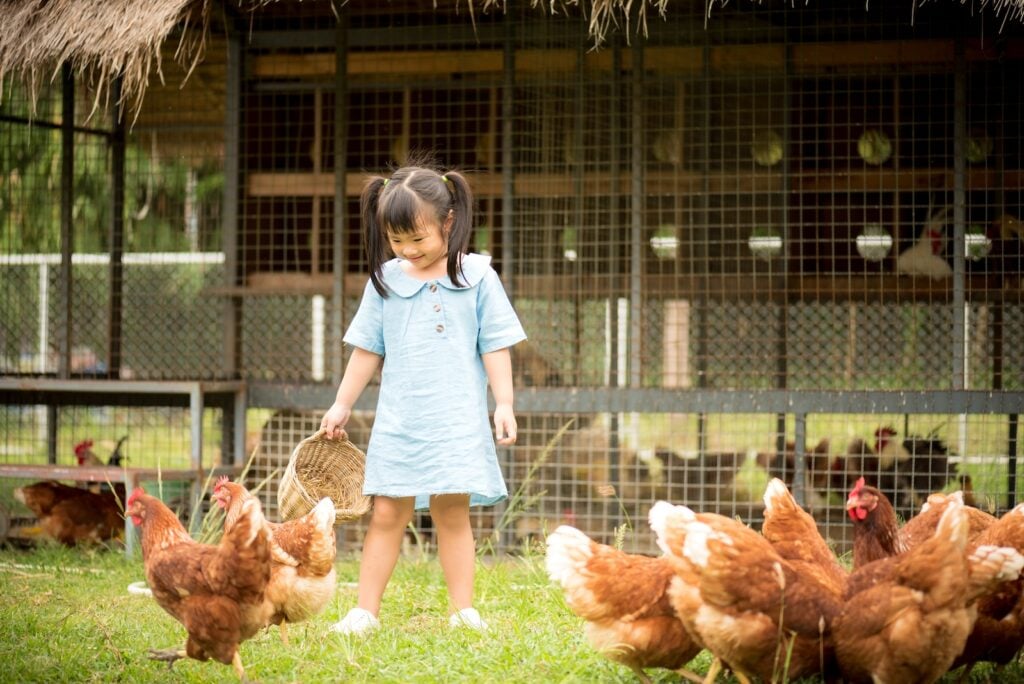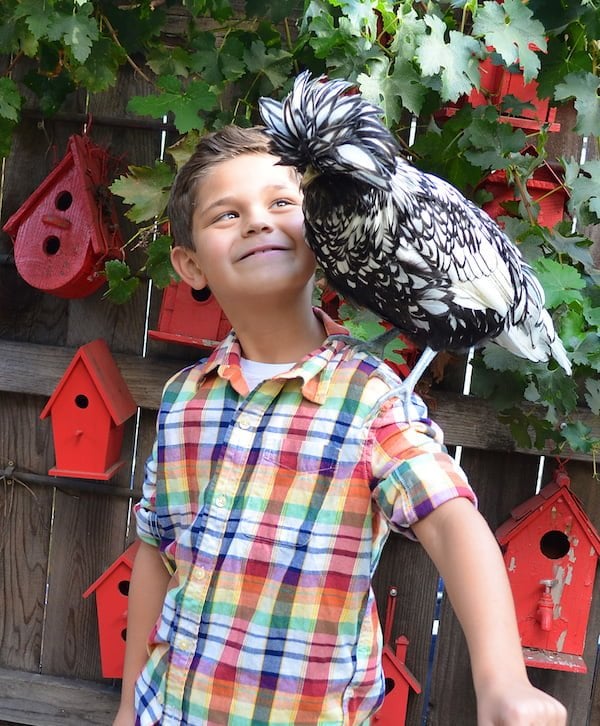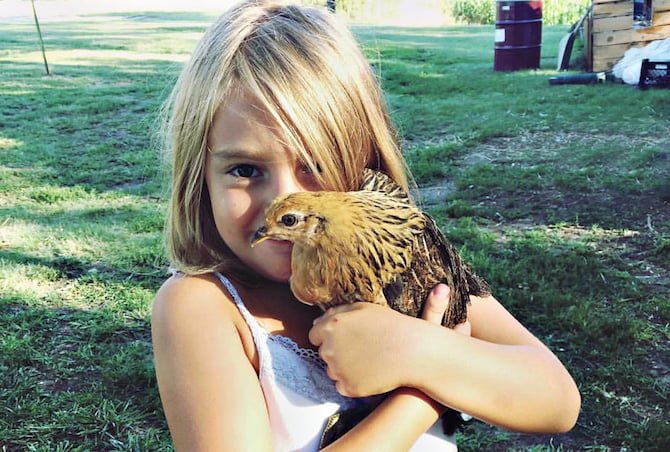Children and Chickens: What Backyard Chickens Can Teach Kids
Children and chickens may not seem as natural a combination as a child and a puppy, but many families have been surprised and delighted by the bonding experience they have with a flock of chickens.

Keeping a small flock of chickens in the backyard is much more than a passing trend. More people are happily learning (or relearning) that chicken keeping is an activity for the whole family.
Like planting a garden with kids – and getting even the smallest of children excited about growing their own food to eat – teaching kids about responsibility and empathy for animals, even (or especially) those that provide our breakfast, is a powerful and important lesson.
Chickens are fairly low maintenance and don’t require much other than daily feed and water. They also need to be locked up in a secure coop at night to keep them safe from predators. If the kids are a bit older, their abandoned playhouse can be quite easily transformed into an adorable chicken coop.
A garden shed also is simple to convert into a coop – although not many are willing to give up their potting shed! But sectioning off an area to allow chickens a space would work. For those who are more handy, building a small coop is a great weekend project.
The Benefits of Kids Caring for Chickens
Small children can help collect eggs, scatter treats for the chickens, and learn how to refill feeders. Older kids can be responsible for making sure waterers are full, cleaning the coop, and helping to round up the flock at the end of the day. Chicken responsibilities also make great summer activities for older kids.
In addition to learning responsibility, there are other lessons that chicken keeping teaches. Counting the number of eggs collected and keeping a weekly chart to track the results is a great lesson in arithmetic, as is doing a nightly headcount to make sure each hen is safely in the coop and on her spot on the roosting bar.
Since chicken eggs can come in different colors ranging from greens and blues to cream, tan and white, little ones can practice naming the different colors or sorting eggs by color.
But even beyond the potential teaching opportunities that chicken keeping offers for parents, chickens that have been hand raised from chicks and handled frequently grow to be friendly, affectionate pets.
Chickens will learn their names and come when called – or at least when treats are involved! The whole family will delight in watching their chickens chase grasshoppers, sprawl in the sun taking dust baths and stroll around the yard, clucking contentedly.
Since chickens are small and fairly non-threatening, they are more family-friendly than some of the larger types of livestock and perfect for children of all ages.
It’s important to supervise small kids when they are handling baby chicks especially, so the chicks don’t get dropped or injured. Show little ones how to handle the chickens gently and not to chase them. You can also show them how to gently pick up a hen. These all teach empathy and following an animal’s cues.
Reminding children not to put their fingers in their mouth or to rub their eyes while they’re around the chickens and to wash their hands afterwards are all good lessons in biosecurity and disease prevention.
Plant a Garden for Your Backyard Chickens
Getting the whole family outside, planting or weeding a garden, doing chicken chores or just enjoying watching the chickens wander in the backyard looking for bugs, seeds and grass to eat, contributes to valuable family bonding time as well.
Chickens love to nibble on plants and flowers, so keeping them out of the garden during the growing season is critical, but they can be put to work turning the soil and looking for garden pests during the off season. They will also eat any wilted, bruised, or bug-eaten garden produce during prime gardening season.
Kids can even help plant the chickens a garden of their own. Chickens can eat nearly anything that can be grown in a garden, except onions, unripe tomatoes/plants and leaves, eggplant, rhubarb, white potatoes, and avocados, all of which contain toxins that can be harmful to chickens.
All the culinary herbs have wonderful health benefits for chickens – and herbs are easy to grow. Like chickens, herbs don’t need much space, so they’re perfect for a backyard of any size.
The Best Chickens for Kids
Here are some of the best chicken breeds for kids and a little on why they are suitable.
- Silkie: These fluffy, friendly chickens are known for their calm temperament and gentle nature, making them perfect for kids.
- Cochin: With their feathered feet and docile personality, Cochins are easy to handle and enjoy being around people.
- Plymouth Rock: These chickens are hardy, friendly, and curious, making them excellent companions for children.
- Sussex: Sussex chickens are known for their inquisitive nature and friendliness, often seeking human interaction.
- Wyandotte: With their beautiful plumage and calm nature, Wyandottes are even-tempered and good for families.
- Australorp: Known for their easygoing and friendly disposition, Australorps are great layers and gentle with kids.
Chicken Breeds to Avoid
Not all chicken breeds are suitable to live around children, primarily due to their temperament, size, or behavior.
Game breeds like Old English Game and Modern Game chickens were bred for fighting and can be territorial and aggressive. This is especially the case with roosters.
Leghorns are another breed that might not be ideal. They can be flighty, nervous, and not fond of being handled, making them difficult for children to manage.
Rhode Island Reds can also be problematic as the roosters can be territorial and aggressive, especially during the breeding season.
Male chickens can be aggressive, particularly when defending their flock. This aggression can show up as pecking, chasing, or even attacking. This behavior is especially pronounced during mating seasons when roosters are more protective. Their spurs can cause injuries if they become defensive.
Parents should be mindful of the individual personality of roosters, as some may never become aggressive, while others may pose a consistent risk.
Hens are generally the way to go when it comes to kids. And as always, be sure to supervise your child around any animals.
Welcoming chickens to your backyard will not only supply your family with delicious, fresh eggs, it also teaches many valuable life lessons your child will carry for life.


